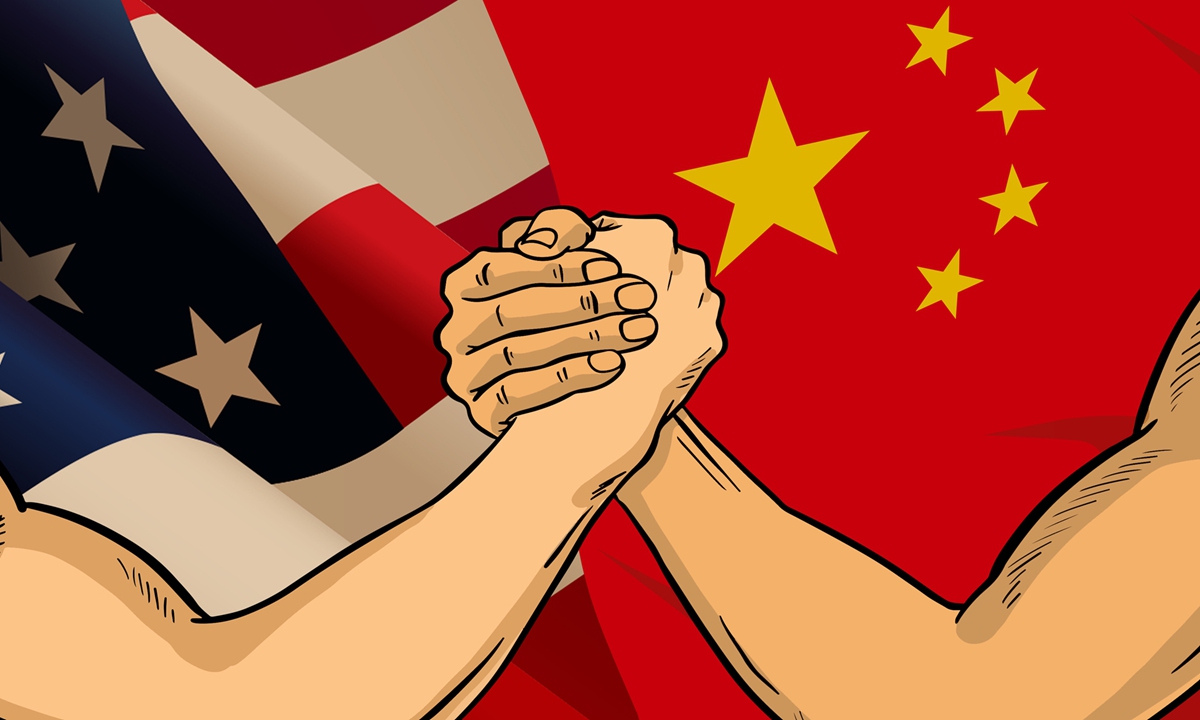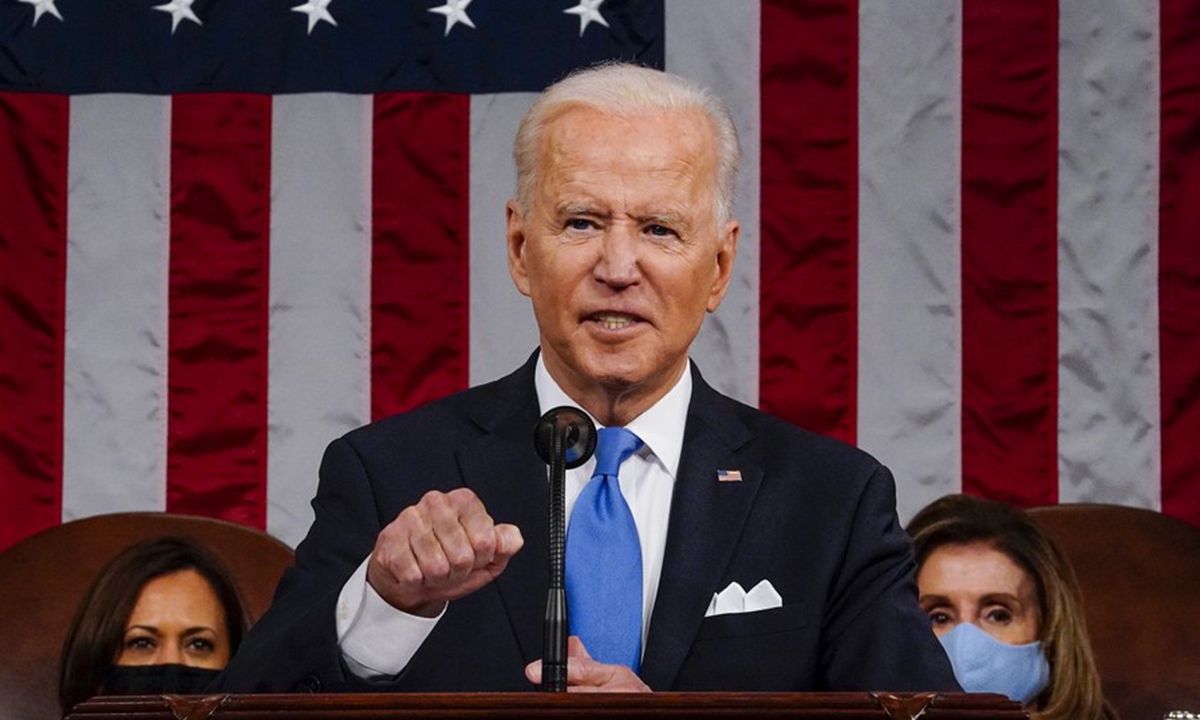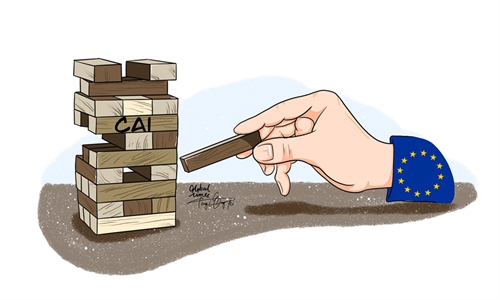China hits back at US competition bill
‘Politically correct’ act strangles US businesses’ ability, disrupts global cooperation: analyst

China-US relations Photo: GT
China on Wednesday harshly criticized the US Senate's passing of an innovation and competition bill, saying that the legislation is full of Cold War mentality, grossly interferes in China's internal affairs and is doomed to fail, urging Washington to halt the legislation to avoid further damaging China-US relations and cooperation.
As the US continues to step up its aggression against China in a wide range of geopolitical and trade areas in a series of recent actions, including sanctions on more Chinese businesses and products, pressuring allies against China and interfering in China's internal affairs regarding the island of Taiwan, China's top legislature is also moving forward with an anti-foreign sanctions law that would provide legal and institutional support to counter foreign sanctions and interference.
Analysts said that any concrete actions from the US bill that hurt China's interests will be met with resolute countermeasures from China. With its malicious nature and widespread implications for the global science and technology community, the US bill, which is still going through procedures in the US Congress, will not change the increasingly confrontational China-US ties and will only reinforce China's head-on pursuit of technological independence, analysts noted.
Legislative intervention
After much hype, the US Senate on Tuesday passed the so-called US Innovation and Competition Act of 2021, which seeks to bolster the US' technological innovation capabilities and competitive edge against China through massive government subsidies.
However, the bill has been largely advertised by US lawmakers and media reports as a countermeasure against China's rapid rise, with some even calling it the "China competitiveness bill."
In a harshly worded statement on Wednesday, the Foreign Affairs Committee of the National People's Congress (NPC), China's top legislature, expressed its strong dissatisfaction and firm opposition to the bill, which fabricates the so-called "China threat" to preserve the US' global hegemony and seeks to deprive China of its legitimate development rights through technological and economic "decoupling."
"At a time when the world is entering a period of turbulence and change, the practice of treating China as an 'imaginary enemy' at every turn is against the general trend of the world, unpopular around the world and doomed to fail," reads the statement.
The statement comes as the NPC's Standing Committee is moving ahead with an anti-foreign sanctions draft law this week, which aims to counter unilateral and discriminatory sanctions imposed by foreign governments on Chinese entities and individuals.
Playing up the "China threat," the US legislation directs US officials to target China's state-owned enterprises over so-called intellectual property "theft" and forced technology transfers. The US government is directed to impose sanctions against Chinese entities and individuals for stealing US trade secrets and work with its allies to stop exports of goods made with intellectual property.
The legislation includes a ban on US officials attending the 2022 Beijing Winter Olympic Games over so-called human rights concerns and the fabricated "genocide" accusations against Northwest China's Xinjiang Uygur Autonomous Region.
Describing the legislation as interference in China's internal affairs, a spokesperson for the Chinese Ministry of Foreign Affairs called on the US to halt the legislation.
"China urges the US to correct its attitude, view China's development and China-US relations rationally, stop advancing relevant bills, and stop interfering in China's internal affairs, in order to avoid damage to the overall China-US relations and cooperation in important areas," spokesperson Wang Wenbin said.
The bill is now heading to the US House of Representatives for passage before reaching the desk of US President Joe Biden. Once adopted, it would mark a serious escalation in the US ever-broadening containment campaign against China, analysts said.
"Once it is adopted, the bill will elevate the US' political actions against China to legislative intervention, which could result in a series of sanctions and other punitive moves against China," Li Yong, deputy chairman of the Expert Committee of the China Association of International Trade, told the Global Times on Wednesday.
Already, the Biden administration has been stepping up crackdowns on China. On June 3, it issued an administrative order to blacklist 59 Chinese companies that it deemed to have military ties. On Tuesday, it outlined measures to address supply-chain issues that could lead to sanctions and tariffs against Chinese companies or products.
Also this week, the Biden administration is reportedly launching trade talks with the island of Taiwan, which is in direct challenge to China's internal affairs. In Europe, US officials continue to pressure its allies against China with ideological and political lies over human rights violations.
"Despite US officials' words about not seeking conflict with China, everything the US does is confrontational... there should be no illusion that will change," He Weiwen, a former senior trade official and an executive council member of the China Society for World Trade Organization Studies, told the Global Times on Wednesday, adding that even when the US pursues trade talks with China, "it is just part of its broad confrontational approach."

US President Joe Biden addresses a joint session of Congress in Washington, D.C. on April 28. Photo: Xinhua
China countermove
Any sanctions or other punitive measures against China will definitely prompt swift countermeasures, analysts said, as China is sharpening its legal tools to counter rising sanctions and meddling by the US and some Western forces.
In parallel to the US Congress's procedures for the competition act, the NPC Standing Committee is reviewing its own anti-foreign sanctions draft law at its ongoing session that is set to conclude on Thursday.
The law would provide forceful political support and guarantees for China to counter discriminatory measures, which is to "give someone a taste of their own medicine," said the spokesperson of the Legislative Affairs Commission of the NPC Standing Committee, according to China Central Television.
However, in terms of economic and industrial policy, the US bill will not bring any new challenges to China and instead it could strangle US businesses' ability to pursue scientific and technological innovation because it discourages market competition and disrupt global cooperation, analysts said.
"The US bill lacks professionalism and sound economic and trade policymaking. It is all about political correctness within the US domestic political ecosystem. It's about winning votes," He said, noting selling the "tough on China" rhetoric may win some votes, but will not help US businesses.
Even if the legislation is adopted, its implementation could face serious hurdles posed by battles between different political parties, interest groups and industries, analysts said. While the bill has support from both Democratic and Republican lawmakers, there are differences over how to allocate the funds or how to pay for the massive $250 billion bill.
"Even if it becomes law, the bill will face serious practical problems simply because it goes against market rules and trends," Li said, noting that many of the sectors such as semiconductors require a globalized supply chain, but the bill is seeking an "American centric" industrial chain. "That just won't work."
The move could even help reinforce China's rising technological capabilities, as the country has been pursuing technological independence, while promoting global cooperation through market opening, analysts said.
"China is already leading in 5G and some other sectors. There are about 30 choke-point technologies that are already facing foreign restrictions. Nothing in this bill will change that status quo," Li said.





